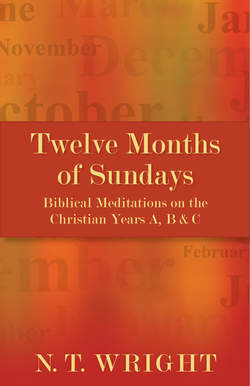Читать книгу Twelve Months of Sundays - N.T. Wright - Страница 14
На сайте Литреса книга снята с продажи.
ОглавлениеThe First Sunday of Christmas
Isaiah 63.7–9
Hebrews 2.10–18
Matthew 2.13–23
More Isaianic translation problems. Fortunately here the meaning is not in doubt. ‘In all their affliction he was afflicted, and the angel of his presence saved them’? – or is it ‘He became their saviour in all their distress; it was no messenger or angel, but his presence that saved them’? Either way, the underlying point is that YHWH, Israel’s God, did not send someone else to rescue his people when they were in their deepest need. He came and did it himself. He could (the second version implies, echoing the debate between God and Moses in Exodus 32—34) have sent a lesser being, but was eventually persuaded to accompany Israel in person, consistent with his action when he heard their cry in Egypt and came to save them. The prophet looks back to the Exodus to invoke this same compassionate, grieving, personally present God for his own day.
Egypt forms the link with today’s gospel (our nicely nonsensical calendar means that we get the Flight into Egypt before the Epiphany). Again, this is hardly likely to have been invented simply on the basis of Hosea 11.1, quoted in v. 15; nor is Matthew unaware that God’s ‘son’, for Hosea, was of course Israel itself (compare Exodus 4.22). Jesus specifically takes on the role of Israel, doing as an unwitting baby what Isaiah said YHWH had done, coming to where the people were in distress, recapitulating the story.
The house of Herod, who hover balefully in the background throughout Matthew’s Gospel, are introduced in this chapter for the first time (does Matthew’s genealogy, sweeping down the royal line from Abraham to David to Jesus, owe its existence to Jews who kept the true Davidic hope alive during the Hasmonean and Herodian years?). First the old man, bitter, ill and paranoid, lashing out, as we know from Josephus he regularly lashed out, at anything that might conceivably be a threat. Then his son Archelaus, the new ‘king of the Jews’, who lasted ten years until popular dislike ousted him, to be replaced by direct Roman rule. Antipas, another son, will appear soon enough. Matthew’s story reminds us vividly that the good news of God’s personal redeeming activity had from the first to make its way in the disorderly and dangerous real world of violence and conspiracy.
This is exactly the point made by Hebrews. These readings nullify any Christmas sentimentality, and insist that, from the first, Jesus embodied the living, saving God, personally present with his people. Like us in every respect, suffering and being tempted, he is able to help. That’s another contrast between the true God and the idols; they are able to thrill, but they can’t help. They can excite, but they can’t rescue. There is only one God who can. To believe in the incarnation is not to perform a mental conjuring trick, but to swear allegiance to the God who had always acted like that, whose love would be satisfied with nothing less.
